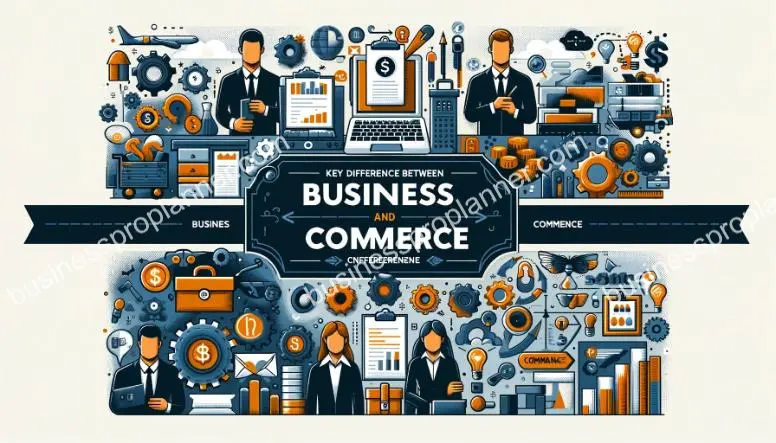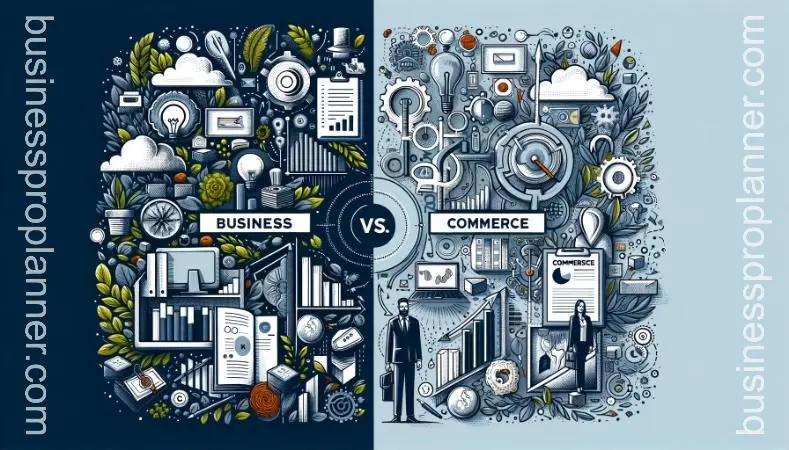The business world has become deeply intertwined with commercial activities. However, business and commerce have different scopes that encompass various roles and objectives. Business and commerce are terms that are often used interchangeably in day-to-day conversations. However, there are key differences between commerce that impact strategic decision-making, career choices, and legal compliance. Failing to distinguish between these concepts can lead to misunderstandings.
Students, entrepreneurs, and professionals need to recognize the nuanced distinctions between business and commerce. Recognizing the nuances between the two can provide crucial insights for professionals and help students make informed career choices.
Although deeply linked, business and commerce are unique forms of economic activity. This article provides a complete comparison that highlights their distinct purposes, functions, and significance.
Defining the Concepts
To grasp the variations between business and commerce, it’s important to first understand what each term means.
What is Business?
Business refers to a broad concept encompassing all activities involved in providing goods and services to consumers for profit. It includes vital organizational functions like:

- Production
- Marketing
- Sales
- Accounting
- Human Resource Management
Business also involves managerial roles that deal with operations, logistics, finances, and general oversight of the enterprise. Fundamentally, business aims to generate sustainable profitability by identifying and satisfying customer needs.
What is Commerce?
Commerce specifically refers to the activities involved in the buying and selling of goods and services. It comprises:

- Wholesale trade
- Retail trade
- International trade
Commerce facilitates the exchange of products and services between two or more parties. It is enabled by activities like advertising, marketing, transportation, warehousing, and other intermediary services. Commerce focuses strictly on the transfer of ownership and distribution of goods to realize financial gains.
Historical Context of Commerce and Business
Trade and commerce have existed since ancient times in various forms. Commerce and trade have existed in some form ever since humans started exchanging goods and services. In ancient times, commerce was carried out through barter systems along trade routes.
The modern concept of business is a more recent development that emerged with the Industrial Revolution. Factories started mass-producing goods, which gave rise to concepts like management, supply chains, and finance that we now associate with businesses.
Industrialization led to large-scale production and global distribution chains supported by commerce networks. Subsequently, the scope of business expanded beyond manufacturing to providing services. The interconnection between business and commerce strengthened, with the success of one relying heavily on the other.
Over time, as commercial activity expanded, other business functions developed to support complex operations. Today, most large-scale businesses involve multiple functions beyond basic production and distribution. Commerce still involves the exchange and sale of goods, but it now operates as a crucial subset within the broader ambit of businesses. Failing to recognize this evolution often leads to conflating business with just commerce.
Academic Perspectives: Bachelor of Business vs. Bachelor of Commerce
The distinction between business and commerce is also reflected in the curriculum structure of related academic programs. A Bachelor of Business degree focuses more on developing well-rounded business acumen. Students gain expertise in multiple business functions beyond the scope of just commerce.
Some key areas of study in a Bachelor of Business include:
- Management
- Marketing
- Finance
- Human Resource Management
- Operations Management
- Strategic Planning
On the other hand, a Bachelor of Commerce degree centers around commercial and transaction-based activities. The emphasis is more on developing skills specific to distribution and trade.
Some areas covered uniquely under a Bachelor of Commerce include:
- Supply Chain Management
- Logistics
- Accounting
- Commercial Law
- E-commerce
- Sales & Advertising
While both degrees provide a solid business education, their distinctive curriculum helps students choose the path best suited to their career interests – whether in general management roles or commercial/trading functions.
Key Differences Between Business and Commerce
Although the lines between business and commerce are often blurred, they have distinct characteristics:

Table of Comparison: Business vs. Commerce
| Aspect | Business | Commerce |
|---|---|---|
| Definition | Business refers to the organized efforts and activities of individuals to produce and sell goods and services for profit. | Commerce is a subset of business that focuses specifically on the exchange of goods and services between parties. |
| Scope | Encompasses a broad range of activities including production, marketing, and management. | Mainly involves the buying and selling of goods, and activities like banking, insurance, and advertising. |
| Focus | Focuses on the creation of products and services and their delivery to customers. | Concentrates on the distribution of goods and services and facilitating trade. |
| Activities Involved | Includes planning, execution, and management of various business operations. | Primarily involves trading activities, which are a part of the business. |
| Educational Path | A business degree covers a wide range of topics like project management, human resource management, and business law. | A commerce degree often focuses on subjects like economics, trade routes, and commercial law. |
| Examples | Running a company, manufacturing products, or providing services. | Selling products in a market, electronic commerce, and international trade. |
Fundamentally, business can operate without commerce, but commerce cannot thrive without the support of business systems and functions. Understanding this distinction is not just academic. It has practical implications in the business world, especially when you are coming up with business ideas or deciding on a future career path.
Legal and Ethical Considerations
Business Law vs. Regulations Governing Commerce Activities
The different realms of business and commerce also intersect when it comes to legal and ethical regulations.
Table of Comparison: Legal Aspects
| Aspect | Business Law | Commerce Regulations |
|---|---|---|
| Focus | Broadly covers areas like corporate governance, contract law, and employment law. | Primarily deals with trade laws, import-export regulations, and commercial contracts. |
| Governance | Governs the internal workings of businesses, human resource management, and business ethics. | Focuses on transactions, trade relationships, and market practices. |
| Compliance | Requires adherence to business management principles and practices, including finance and taxation. | Involves compliance with trade protocols, customs duties, and global trade agreements. |
Addressing Potential Negative Externalities in Both Fields
Table of Comparison: Ethical Considerations
| Aspect | Business | Commerce |
|---|---|---|
| Market Impact | Decisions in business may lead to market monopolies or unfair competitive practices. | Commerce activities can affect global trade dynamics and local markets. |
| Consumer Protection | Businesses must ensure product safety and ethical marketing. | In commerce, there’s a need to safeguard against exploitation in buying and selling. |
| Environmental Responsibility | Business operations might have a significant environmental footprint. | Commerce, especially international trade, needs to consider its ecological impact. |
Responsible business and commerce practices also involve avoiding negative externalities like environmental damage, unethical labor conditions, and financial misconduct.
Examples Distinguishing Business and Commerce
The abstract differences between business and commerce become more apparent. Some examples help distinguish business from commerce activities:
- Running a manufacturing plant where products are designed and mass-produced involves business operations. In contrast, wholesaling these manufactured goods to retailers focuses on commerce.
- Providing consultancy services as a business entity is a business activity. However, processing digital payments to facilitate service delivery falls under commercial functions.
- Creating movies through production is a business venture. In comparison, distributing movies to theaters for screening and selling them commercially is a commerce activity.
In all the above cases, commerce operates as a crucial subset within the ambit of broader business operations to facilitate the exchange and sale of goods and services.
Significance of Recognizing the Distinctions
Identifying the precise differences between business and commerce holds significance for both established ventures and individual careers.
For companies, it enables:
- Streamlining operations and boosting productivity
- Structuring effective teams with specialized roles
- Making optimal investment and diversification decisions
- Developing targeted growth strategies
For professionals, it provides:
- Clarity regarding capabilities needed for specific roles
- Understanding of career development pathways in each domain
- Insights for making informed education and skills training choices
The distinctions can also guide investments into distinct sectors of the economy and crafting policies that impact business or commerce activities.

Conclusion
Business and commerce are intrinsically linked domains that depend on each other for success. However, they are driven by distinct objectives and encompass different capabilities.
Overlooking the nuances between business and commerce can undermine strategic decisions and cause organizational challenges. It can also create confusion for students and professionals planning their career trajectories.
However, by recognizing that business focuses on producing value while commerce centers around distributing value, the different choices become clearer. Keeping their unique purposes in perspective allows both realms to maximize productivity and prosperity.
